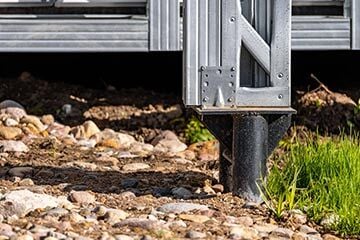We can't pick our neighbours, or stop accidents from happening. Whether it's a stray football smashing your window, or something more serious like water damage. All these things can leave you feeling far from neighbourly.
In most cases, damage caused by your neighbour should be covered by your home insurance policy. You may also be covered if you’ve damaged someone else’s home.
Your home insurance could even cover vandalism or malicious damage. Here’s what you need to know.

What neighbour damage does my home insurance cover?
Neighbour damage can range from serious events like fire and flood to less serious damage like a window being accidentally smashed by a football.
Your house insurance should cover these types of neighbour damage to your home:
Fire and flood
The wording in your home insurance policy should include events like fire and flood caused by neighbours.
For example, a fire starting in your neighbour’s home might mean yours is at risk of fire as well. You should be able to claim on your home insurance policy if the fire spreads and damages your home.
The average buildings insurance claim for fire is £50,984*. For contents insurance it’s £19,795*.
Flood damage caused by escape of water can cost around £14,056* in damage to buildings. It can also cause around £8,367* of damage to your contents, on average.
Structure of your home
This generally refers to damage that occurs when sharing a party wall with a neighbour. Or damage to the structure of your home due to plants or trees on your neighbour's side of the fence.
For example, if your neighbour hasn’t maintained a tree on their property and it fell and damaged part of your home’s structure. On average, a claim for fallen tree damage is around £6,634*.
Accidental damage
Accidental damage includes smashed windows, damage to furniture, or damage to property in the garden.
Depending on the cost of the damage, it may not be worth making a claim given the excess on the policy and the cost of the repair. Also, you might lose your no-claims bonus.
The average claim cost for accidental damage on a buildings insurance is over £4,468*. It’s over £1,956* on a contents insurance policy.
Vandalism and malicious damage
Vandalism and malicious damage can be classed as:
- Smashing windows
- Digging up a lawn of shrubs
- Spraying graffiti on walls
- Arson
The average claim for malicious damage on a contents insurance policy is over £2,653*. And arson claims buildings insurance could reach over £18,157*, on average.
As long as you’re not viewed as being negligent, insurers tend to pay out for vandalism or malicious damage claims.
Negligence is typically damage that occurs after you leave the property unattended with doors and windows unlocked.
Again, whether it’s worth you making a claim on the home insurance policy depends on your excess and the cost of damage.
If you believe the damage was intentional, like vandalism, you should speak to the police and get a crime reference number.
Can I use my home insurance to sue my neighbour for criminal damage?
Yes, if you think it’s necessary. You might be able to use home legal protection insurance to pursue a claim against a neighbour for uninsured losses. This could include things such as criminal damage to a fence by your neighbour from boundary disputes, or damage to driveways or paths.
Legal expenses cover might be included in some home insurance policies as standard. But you can also get it separately as an optional extra.
If you’re trying to sue someone, your insurer is likely to look at the strength of your case before it continues with it.
Home legal protection insurance can also cover you for situations where you need to arrange a legal defence because you’re being sued.
Should I claim on my home insurance for damage caused by my neighbour?
It depends on the circumstances. If there’s a lot of damage, you might decide to put in a claim.
Even if it’s a small claim, you'd still have to pay some of the cost, depending on your home insurance excess. So it might not be worth claiming. There could also be an impact on your no-claims bonus and your future insurance costs.
Before you claim it’s always worth talking to your neighbour first. Though it may feel awkward, you may be able to solve the issue between yourselves. You can see if they'll reimburse you for the cost of repairs or a replacement. If they won't:
- Take photos of the damage and keep any evidence in case you need it later.
- Make a claim on your own home insurance policy.
“Any claim on your home insurance policy could raise your costs by roughly 60%*. And when it comes to neighbour damage, proving who’s legally responsible for the damage can be difficult.
“But it’s comforting to know that your home insurance should provide cover for neighbour damage, whether it’s damage you’ve caused or been a victim of.
“This is why it’s important to have a home insurance policy. Claiming on your home insurance for fire damage, for example, can be in excess of £150,000*. You’d have to pay for this yourself if you didn’t have a home insurance policy in place.”
What our home & lifestyle insurance expert says

Is my neighbour automatically liable for damage caused to my property?
Not automatically, no.
Let’s say there’s a leak from the flat above yours that damages your ceiling. It’s likely your neighbour isn't responsible for repairing the damage if:
- They’ve kept their own home in good condition
- They didn’t know about the leak in advance
But if they knew about the leak in advance and failed to take any action, they might be held responsible.
Your insurance provider should be able to help with the specific details of any case.
What happens if my neighbour doesn’t accept responsibility?
Your home insurer may still pay out on claims for damage to your house even if your neighbour doesn’t accept responsibility.
For larger claims, such as those resulting from fire, your insurer could pursue your neighbour or their insurer for the claim amount later on.
For accidental damage in the low hundreds of pounds your insurer might not pay out if the claim is below the level of your excess.
What if I can't prove that the damage was my neighbour's fault?
For a successful insurance claim, you need to prove that your neighbour caused the damage.
Without evidence, you can still submit a claim but you'd have to claim for the damage on your insurance policy, rather than your neighbours. This could affect your no claims discount.
What happens if my neighbour's builders damage my home?
If your neighbours are having work done on their home, they must ensure your property is protected.
According to GOV.UK, when work is being carried out on a property, you must:
- Avoid causing your neighbours unnecessary inconvenience
- Protect your neighbour’s property from damage caused by the works
- Fix or pay for any damage caused
If the workers damage your home, there may be some debate over who's responsible.
But, whether it’s the fault of the workers or your neighbour, both should have insurance in place. This means you should be able to make a claim without impacting your policy.
If your neighbours refuse to cooperate, there are several people you can contact:
- A mediator
- Your local authority
- A solicitor
Citizens advice has more information on who to contact if you're having issues with your neighbours.
If there’s evidence your neighbour is breaking the law, you can also contact the police to help resolve the issue.
Does my home insurance cover damage to my neighbour’s property that’s my fault?
It can do, but first the insurer has to determine that you’re responsible or liable for the damage.
Usually your neighbour would contact their insurer. Then their insurer would contact your insurer to recover the costs.
But the neighbour’s insurer needs to find evidence that you’re responsible for the damage first.
At this stage, the insurer considers key points such as:
- If your home has been well maintained
- If there’s any issues with your boiler
- If your home has been left unoccupied
- If you were aware of any damage - for example, a leak - and you didn’t do anything about it
These can all impact whether your insurer pays out or not.
*Confused.com data. October 2023 - October 2024. Buildings, contents and combined home insurance policies.








